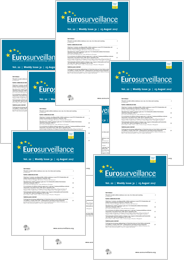- Home
- Weekly releases (1997–2007)
- Previous Issues
- Volume 10, Issue 24, 16/Jun/2005
Weekly releases (1997–2007) - Volume 10, Issue 24, 16 June 2005
Volume 10, Issue 24, 2005
- Articles
-
-
-
Scientists' report outlines European priorities in tackling infectious diseases
More LessThe European Academies Science Advisory Council (EASAC, http://www.easac.org/), whose members represent 22 national science academies across Europe, has this week published a report outlining infectious disease priorities at Europe-wide level identified by an expert panel.
-
-
-
Surveillance of foodborne disease outbreaks associated with consumption of eggs and egg products: Spain, 2002 - 2003
More LessFoodborne disease outbreaks are a public health problem for certain population groups in Spain, because of their magnitude and severity. The foods implicated in these outbreaks tend to be prepared with raw shell eggs, and Salmonella serotype Enteritidis tends to be the causative agent. In Spain, foodborne outbreaks due to consumption of eggs and egg products have not declined since 1998, despite the introduction of numerous prevention measures aimed at addressing this problem. Such measures include health education and making it mandatory for food catering facilities that cook and/or serve meals to replace raw shell eggs with pasteurised egg products when food is prepared without heat treatment and for immediate consumption.
-
-
-
Outbreak of norovirus infection associated with contaminated flood water, Salzburg, 2005
D Schmid , I Lederer , P Much , A M Pichler and F AllerbergerMore LessAn outbreak of gastrointestinal illness in American tourists in May-June 2005 that was first thought to be foodborne has been linked to direct exposure to floodwater contaminated with raw sewage. On 1 June 2005, ORF (the Austrian Broadcasting Company) reported that 26 out of 36 American tourists who had eaten dinner in a well-known restaurant in Salzburg had fallen ill. According to the news report, 10 of the ill tourists had presented to a local hospital, triggering an outbreak investigaton by the local health authorities, who assumed salmonella to be the causative agent.
-
-
-
First results from the new STI reporting system in Cyprus
More LessGenital warts was the most frequently diagnosed sexually transmitted infection (STI) in Cyprus in 2004, according to the first year’s results from the STI Sentinel Network of Clinicians surveillance. This accounted for 242 (32%) of the 757 new cases of diagnosed STIs, with genital herpes (167, 22%) and gonorrhoea (136, 18%) being the second and third most frequent diagnoses. Cases of syphilis made up 3% of the total number of reported STIs.
-
-
Most Read This Month

-
-
Chikungunya in north-eastern Italy: a summing up of the outbreak
R Angelini , A C Finarelli , P Angelini , C Po , K Petropulacos , G Silvi , P Macini , C Fortuna , G Venturi , F Magurano , C Fiorentini , A Marchi , E Benedetti , P Bucci , S Boros , R Romi , G Majori , M G Ciufolini , L Nicoletti , G Rezza and A Cassone
-
- More Less


